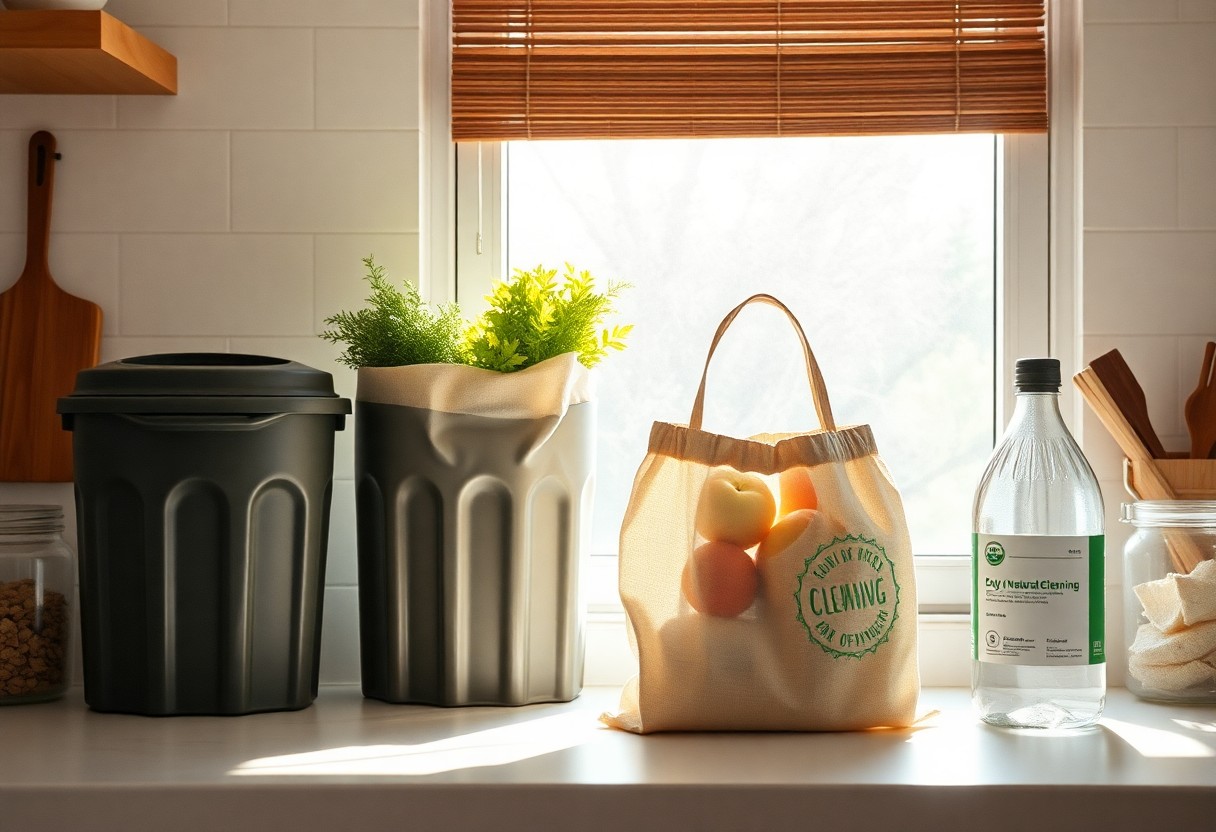Tips for reducing waste in your daily life can make a significant difference in your environmental footprint. By adopting simple yet effective practices, you can minimize waste generation and contribute to a more sustainable future. From rethinking your shopping habits to embracing reusable products, you’ll discover actionable strategies that fit seamlessly into your routine. Join the movement towards waste reduction and learn how your small changes can lead to a larger, positive impact on the planet.

Understanding Waste and Its Impact
While many people overlook the problem of waste, it significantly affects environmental health and resource conservation. By understanding the various forms of waste and their consequences, you can make more informed choices in your daily life. This knowledge is important for everyone who aims to minimize their impact on the planet and adopt sustainable practices.
Types of Waste
After identifying waste, you should recognize the different types. Waste can generally be categorized as:
- Organic Waste (food, yard trimmings)
- Recyclable Waste (paper, plastics, metals)
- Hazardous Waste (batteries, chemicals)
- E-waste (old electronics)
- General Trash (non-recyclable items)
Assume that understanding these categories helps you make better decisions regarding waste reduction.
Environmental Effects
Effects of waste on the environment are profound and far-reaching. Waste accumulation leads to pollution, harming ecosystems and biodiversity, while landfills emit greenhouse gases that contribute to climate change. By reducing waste, you can play a significant role in mitigating these negative impacts.
Understanding the environmental effects of various types of waste enables you to prioritize your actions effectively. For instance, reducing single-use plastics can decrease ocean pollution, while composting organic waste can enrich soil health. Every small choice you make can collectively contribute to a healthier, more sustainable planet.
Practical Tips for Reducing Waste
The best way to minimize waste in your daily life is to adopt simple yet effective habits. Start with the following tips:
- Opt for reusable bags, bottles, and containers.
- Choose products with minimal packaging.
- Compost kitchen scraps and yard waste.
- Plan meals to avoid excess food waste.
- Purchase second-hand or upcycled items.
Perceiving these practices as part of your lifestyle can greatly reduce your waste footprint.
At Home
Beside implementing recycling programs, consider learning about composting and establishing a system at home. You can also turn off lights when not in use and invest in energy-efficient appliances, which not only reduces waste but also cuts down on energy consumption.
In the Workplace
Home offices can also contribute significantly to waste reduction. Bring your lunch in reusable containers, use digital documents instead of printing, and share office supplies to minimize unnecessary purchases.
Reducing waste at your workplace can make a substantial impact. Encouraging colleagues to adopt similar habits not only enhances a culture of sustainability but also creates a collective effort towards minimizing environmental impact. This collaborative approach to waste management can lead to innovative solutions and practices, ultimately benefiting everyone involved.

Sustainable Shopping Practices
You can make a significant impact on waste reduction by adopting sustainable shopping practices. Opting for eco-friendly products and mindful consumerism can lower your environmental footprint while supporting brands that prioritize sustainability. By choosing products with minimal impact on the environment, you contribute to a cleaner future with every purchase.
Choosing the Right Products
At the heart of sustainable shopping is the selection of products that align with eco-conscious values. Focus on items made from natural or recycled materials, and seek out brands that adhere to ethical manufacturing practices. This approach not only supports a healthier planet but also encourages the market to shift towards more sustainable options.
Reducing Packaging Waste
Shopping with a focus on reducing packaging waste can dramatically lower the amount of trash produced in your daily life. Opt for bulk items, reusable containers, and package-free stores whenever possible to minimize waste generated through packaging.
In fact, buying in bulk not only cuts down on excessive wrappers and boxes but also often saves you money in the long run. Carry your own reusable bags and containers to shops, and choose products that come with minimal or recyclable packaging. By making conscious decisions about the items you purchase, you foster a culture of sustainability that influences both your lifestyle and the market.
Composting and Recycling
Unlike traditional waste disposal methods, composting and recycling can greatly reduce your environmental impact. By composting organic materials, you can divert waste from landfills and create nutrient-rich soil for your garden. For more effective waste reduction tips, check out What is your one top tip for reducing waste?
Benefits of Composting
Between improving soil health and reducing greenhouse gas emissions, composting offers a multitude of benefits. It allows you to recycle kitchen scraps and yard waste, minimizing the amount sent to landfills while enriching your garden’s soil with imperative nutrients.
How to Recycle Effectively
Any successful recycling initiative starts with understanding what materials can be recycled in your area. Familiarize yourself with local regulations and sorting guidelines to ensure you’re disposing of items correctly. Clean and dry your recyclables to avoid contamination.
Benefits of recycling include conserving natural resources, saving energy, and reducing pollution. By actively participating in recycling programs, you contribute to a more sustainable community and decrease the demand for raw materials. Always stay informed about local recycling rules and participate regularly to maximize your impact.
Embracing Reusable Alternatives
Your journey toward reducing waste begins with embracing reusable alternatives in your daily life. By opting for items like stainless steel water bottles, cloth shopping bags, and beeswax wraps, you can significantly minimize single-use plastics. For more guidance, check out 10 Tips for Reducing Waste at Home. These practical choices contribute not only to a healthier planet but also enhance your lifestyle.
Items to Replace
Beside traditional plastic items, consider replacing disposables with reusables that serve the same purpose. Swap out paper towels for cloth towels, use a reusable coffee cup, and choose a durable lunchbox instead of plastic wrap. Each small change adds up, making a big impact on your overall waste footprint.
Long-term Savings
Across your daily routines, switching to reusable items can lead to significant long-term savings. Initially, reusable products may seem a bit more costly, but they prove to be economical over time. You’ll purchase fewer consumables, leading to reduced spending.
Items such as stainless steel straws, silicone food storage bags, and reusable cleaning cloths not only save you money in the long run but also often offer better performance compared to their disposable counterparts. Investing in high-quality reusables can decrease your ongoing expenses significantly. As you reduce the frequency of purchases and waste disposal costs, you’ll notice a positive impact on your budget—turning your sustainable choices into smart financial decisions.
Educating Others on Waste Reduction
Keep in mind that sharing your knowledge about waste reduction can significantly impact your community. By raising awareness, you encourage others to adopt sustainable practices in their daily lives. Explore Eight Ways To Reduce Waste to guide your discussions and motivate others to join the movement towards reducing waste.
Community Involvement
Around your neighborhood, engage with local organizations focused on sustainability. Participate in community clean-up events or workshops that promote waste reduction techniques. Your involvement can inspire others while building a sense of camaraderie in preserving your environment.
Sharing Knowledge Online
Between social media platforms and online forums, you have countless opportunities to share valuable information about waste reduction. By posting tips, articles, or personal experiences related to sustainable living, you can influence a broader audience and encourage healthy discussions.
Another effective way to share knowledge online is to create informative content such as blogs or videos that demonstrate easy waste reduction practices. Consider hosting virtual workshops or webinars where you can directly engage with an audience, answer questions, and provide practical solutions for everyday waste challenges. Your voice online can resonate with many, fostering a collective effort towards a greener future.
1. Use reusable bags for shopping instead of plastic.
2. Opt for bulk purchases to minimize packaging waste.
3. Compost food scraps to reduce landfill contributions.
4. Repurpose items creatively instead of discarding them.
5. Choose digital alternatives over paper whenever possible.
6. Support local businesses to lessen transportation waste.
Summing up
From above, it’s clear that reducing waste in your daily life is achievable with practical strategies. You can start by embracing reusable products, minimizing single-use items, and practicing mindful consumption. Opting for local and sustainable sources not only cuts down on packaging waste but supports your community as well. Implementing a recycling and composting system at home can also divert materials from landfills. By gradually integrating these tips into your lifestyle, you will significantly lower your waste footprint and contribute to a healthier environment.



